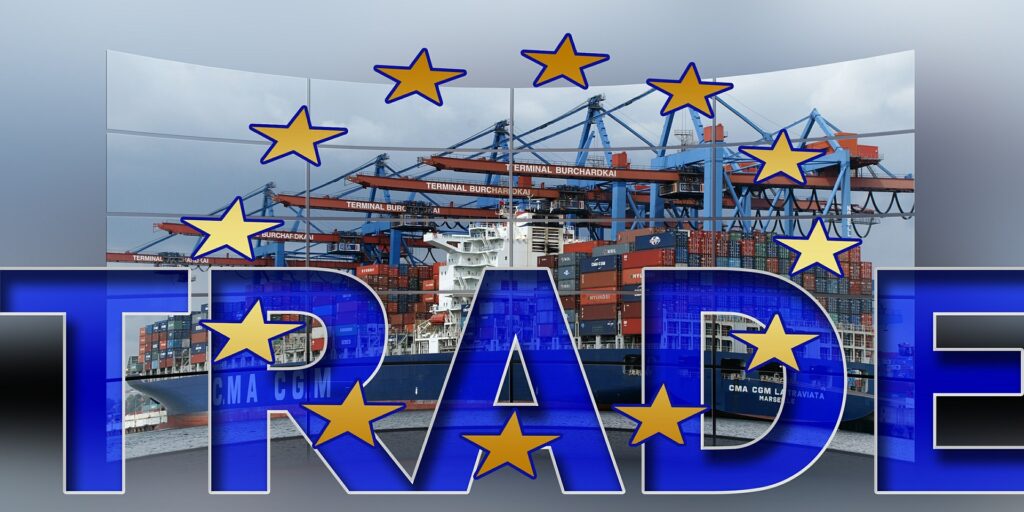Egypt’s largest trade partner, Europe, is going through a consumption, manufacturing, and energy transformation due to rising inflation, the pandemic and the war in Ukraine. Those shifts present Egypt with opportunities that could shape trade flows for years to come.
Egypt has been on a fast economic recovery trajectory since GDP shrank 1.7% during the second quarter of 2020. By the third quarter of 2021, GDP growth rates had reached 9.8%, according to the Central Bank (CBE). The World Bank said in its January 2022 Global Economic Prospects report about Egypt that “growth is expected [to continue] supported by external demand from major trading partners.”

Europe as a whole — EU and non-EU states — is Egypt’s largest trade partner, accounting for 36% of value in fiscal year (FY) 2020/2021, according to the CBE. Like other countries around the world, European nations have gone through a bad economic period since the onset of the COVID-19 pandemic in March 2020. “Multiple headwinds have chilled Europe’s economy this winter: the swift spread of Omicron, a further rise in inflation driven by soaring energy prices and persistent supply-side disruptions,” European Economic Commissioner Paolo Gentiloni, told the press in February, nearly two weeks before Russia invaded Ukraine.
The war has only exacerbated the continent’s economic woes. By early March, Credit Suisse said the EU’s economy would grow 1% this year compared to the 4% forecast by the EU Central Bank (ECB) in January. “Europe is entering a difficult phase. We will face, in the short term, higher inflation and slower growth,” said Christine Lagarde, ECB president, in late March. “There is considerable uncertainty about how large these effects will be and how long they will last.”
Those disruptions could lead to more Egyptian exports to the EU as the bloc reassesses trade relations with major partners, particularly Russia. However, the extent of those opportunities could depend on the EU’s economic outlook, currently a mixed bag of optimism and volatile geopolitics.
New reality
The war itself and sanctions on Russia could reshape Europe’s trade for the long term. “The attack by Putin and the Russian leadership on Ukraine represents a turning point for Europe and the entire world,” wrote Cora Jungbluth, senior expert in international trade and investment at Bertelsmann Stiftung, a German think tank, in a March blog.
The EU likely will look to diversify its portfolio of suppliers, as well as modes of transportation and routes. The pandemic showed “how serious the economic consequences can be if these supply chain relationships are disrupted, but also when the Suez Canal was blocked by a container ship in March 2021 – and now, during the Ukraine war,” wrote Jungbluth.
Europe’s future trade decisions probably won’t be based only on economics. “International trade relations will no longer be viewed solely in terms of economic advantage, but also … geopolitical considerations,” said Jungbluth. “In shaping their foreign trade relations, more and more countries are aiming to achieve their political goals.”
Lastly, Jungbluth predicts the EU will revisit economic relations with all partners, particularly in “far-flung, low-wage countries.” That should greatly benefit Egypt, given its geographic proximity, trade infrastructure and amicable political relations with the EU.
Egypt and Europe
Egypt has two free trade agreements with the EU. The 2004 EU-Egypt Association Agreement removed all tariffs and fees on industrial products. Six years later, the Euro-Mediterranean Agreement removed tariffs and customs on agricultural products, processed foods, fish and fishery products from Egypt.
Those agreements helped the EU become Egypt’s biggest trade partner. Top exports are petroleum products and crude oil, which account for 54% of all exports to the bloc. Other categories are pharmaceuticals (10.8%), wires and cables (6.6%) and household electronics (5.8%).
Based on CBE data, the European countries that Egypt trades with the most are Germany, Switzerland, Italy, the United Kingdom, Belgium and France.
Egypt could further expand that cooperation by reviving “Deep and Comprehensive Trade Area” negotiations with the EU, which ended soon after they began in June 2013. “It would extend beyond the association agreement to include … trade in services, government procurement, competition, intellectual property rights and investments,” said the European Commission’s blurb on relations with Egypt.
Fuel fallout
The war in Ukraine has been a wake-up call for the EU, which imports 40% of its natural gas from Russia. According to statistics aggregator Statistica, natural gas is used for 38% of the bloc’s heating needs and represents 22% of all energy consumption. Petroleum products are the most popular fuel, accounting for 36% of consumption, and a quarter of that comes from Russia, according to Eurostat, the bloc’s statistics office.
Since the war started on Feb. 24, European countries, the United States, and other developed nations have imposed economic sanctions on Russia. Within days, the EU suspended the certification of Nord Stream 2, a natural gas pipeline between Russia and Germany. Since then, the EU has imposed a catalog of sanctions, including freezing Russian assets and preventing state-owned financial institutions from using the SWIFT global bank messaging system. And while it is debating an embargo on Russian coal, the EU has refrained from sanctioning gas and oil imports.
Although the EU has been treading carefully to maintain its natural gas and oil supplies, prices have increased. Through Apr. 8, 2022, natural gas prices increased by nearly 71% and oil by 26.8%.
Russian Deputy Prime Minister Alexander Novak warned the situation could become more volatile during a televised statement on Mar. 6: “It is absolutely clear that a rejection of Russian oil would lead to catastrophic consequences for the global market … The surge in prices would be unpredictable.” Reuters reported in March that a “senior minister” said Russia could halt natural gas and oil exports to the EU in reaction to sanctions.
Accordingly, EU member states have been looking for immediate and long-term fuel suppliers. “We must become independent from Russian oil, coal and gas,” said European Commission President Ursula von der Leyen. “We simply cannot rely on a supplier who explicitly threatens us.”
On Mar. 24, von der Leyen met with U.S. President Joe Biden to “prioritize [liquified natural gas] deliveries from the United States to the European Union in the coming months,” the EU official told the press a day before the meeting. At press time, there were no updates.
Von der Leyen and other EU officials also visited officials from Azerbaijan, Qatar and Scandinavian countries to discuss natural gas. They also talked with Saudi Arabia and the United Arab Emirates to try to secure petroleum products. “We aim to have a commitment for additional supplies for the next two winters,” von der Leyen told EU lawmakers in Brussels in March. Lastly, the EU asked OPEC, the cartel comprising the world’s largest oil producers, to increase production.
Egypt’s opportunity
Those developments could give Egypt a significant opening to supply the EU with more natural gas than ever before. In 2021, Egypt exported 2 million metric tons of liquified natural gas to the EU. That is around XX% of the Union’s imports in 2021.
Before the war, experts touted Egypt as a potential major natural gas supplier to the EU. “Egypt’s recent offshore and onshore gas discoveries increased its natural gas reserves,” said Jan Mazač, a junior associate in the Center for Global Political Economy and a member of the Research Group for Energy Policy, in 2018. “One of the options for strengthening the energy security of the European Union and reducing its dependence on Russia is the utilization of gas-rich areas like Egypt.”

According to OPEC data, Egypt’s natural gas wealth comes from the flagship field, Zohr, the largest discovery in the Mediterranean. Its output has allowed Egypt to become a net exporter of natural gas since 2015. The Information and Decision Support Center (IDSC) announced that by the end of 2021, natural gas exports had nearly quadrupled compared to 2020.
Meanwhile, the government has been increasingly keen to boost natural gas exports since the start of the war. In late February, state spokesman Nader Saad said rising energy prices, particularly for natural gas, could be good for the country by creating “an opportunity to export … to compensate for purchases of oil and wheat, which are affected by the situation in Ukraine.”
Most of those exports could go to the EU, thanks to the extensive infrastructure connecting it with Egypt. “As a result of the existing plants, Egypt is … able to respond to Europe’s needs,” Charles Ellinas, a nonresident senior fellow at the Atlantic Council Global Energy Center, told Al-Monitor in March. “There is sufficient unutilized natural gas in the eastern Mediterranean to increase LNG by another 10 to 15 billion cubic meters per year. Most of that can be exported to Europe.”
In April, Sameh Shoukry, Egypt’s foreign minister, and Frans Timmermans, the European Commission’s executive vice-president, signed an agreement to “reinforce cooperation on LNG …. among Europe, Africa and the Gulf,” reported Al Ahram newspaper.
Long term supplier
To capitalize on the EU’s rising need for natural gas, Egypt would need to send a significantly bigger portion of its production to the bloc. Egypt’s current confirmed natural gas reservoirs could be sufficient to help plug at least part of the EU’s shortage via the Zohr field alone, said Mazač.
Meanwhile, Ellinas of the Atlantic Council Global Energy Center, noted the EU is more open to new supply deals that meet its short-term demand. “With as much as 200 billion cubic meters per year to replace — which is the volume of Russia’s gas exports to [the EU] — Egypt will find it very easy to secure more export markets in Europe.”
To meet the ever-increasing demand for Egyptian natural gas, the government must expedite investments in the Idku and Damietta LNG plants. “Without available additional volumes, exporting to [the EU] will be a dream only,” said Cyril Widdershoven, founder of Verocy, a Dutch geopolitical consultancy focused on the MENA region, to Al-Monitor in March. “There needs to be expansion inside of Egypt or in the eastern Mediterranean to support LNG exports to [the EU] soon.”
In the long term, Mazač noted, Egypt has an unprecedented opportunity to meet a significant portion of Europe’s demand for LNG if it cooperates with Cyprus and Israel. “That would involve the transportation of Israeli and Cypriot offshore gas reserves to Egypt for re-export from one or both the LNG facilities on Egypt’s northern coastline,” wrote Mazač.
In 2016, Egypt and Cyprus agreed on a pipeline to connect the Aphrodite gas field to Egypt. In September 2021, both parties agreed to expedite its construction but offered no timeline. Meanwhile, there is an operational natural gas pipeline with Israel to liquefy Israel’s natural gas designated for the EU.
Other opportunities

Europe’s current problems don’t solely revolve around the war in Ukraine. According to the U.S. Department of Agriculture (USDA), EU production of oranges has declined by 0.8% compared to the previous season, which was 6% less than the year before. That is 3.3% less than the continent’s 10-year average production. The U.S. agency blamed drier-than-usual weather in Spain and Italy, where 80% of the crop is grown.
Meanwhile, orange consumption in the bloc has been increasing. According to the U.K. Ministry of Agriculture, Fisheries, and Food, EU imports of oranges increased gradually between 2014 and 2020, except for 2019.
That trend likely will continue this year. “For 2021-2022, EU orange imports may rise due to the expected decline in EU orange supplies,” said a USDA report.
Egypt has all the resources necessary to close that widening gap, further increasing its foothold in the EU market. According to the USDA’s Foreign Agricultural Services agency, the country is the world’s top exporter of oranges.
Egypt also has a robust export infrastructure with the EU. According to the UK ministry, Egypt outpaced South Africa as Europe’s top supplier of oranges in the first eight months of 2021. From January through August 2021, Egypt exported more oranges to the EU than in all of 2020, according to the USDA.
Tech security
Another primary concern for the EU is its lack of competitive semiconductor and microchip industries, resulting in near total dependence on imports. Germany, however, plans to invest 3 billion euros ($3.2 billion) in producing semiconductors, the building blocks for microchips. “Access to sufficient microchips will become a competitive element for any successful global economy in the coming years,” Germany’s Economy Minister Peter Altmaier stressed at a press conference in August. “We must act if we want to preserve our technological sovereignty.”
The announcement is part of the framework set by the European Initiative, which prioritizes “important projects of common European interest.” According to Oliver Noyan, a senior editor at the pan-European news portal Euractiv, the initiative was “motivated by the worldwide semiconductor supply shortage resulting in production losses.”
In February, von der Leyen of the European Commission announced the European Chips Act, which addresses “investment, a regulatory framework and the necessary strategic partnerships to make [the EU] a leader in this market. It will enable 15 billion euros in additional public and private investment until 2030. This comes on top of 30 billion euros of public investments we have already planned, for example, in NextGenerationEU, in Horizon Europe or in national budgets.”
Egypt has a massive long-term opportunity to become a supplier of silica sands, the building blocks of the semiconductor industry. According to 2017 research by South Valley University in Qena, almost all of Egypt’s silica sand reserves are in 11 locations along a 400-kilometer (249-mile) coastal strip. According to the Nuclear Minerals Authority, those reservoirs are easily accessible and have the highest-grade 95% to 99.5% pure silica.
So far, there has been no government strategy to capitalize on that resource. Instead, private companies mainly use nearly 30% of extracted silica sand to make glass. The rest is exported. That opens the door to attracting FDI from the EU to make Egypt a supplier for future semiconductor factories.
Consumption outlook
A significant factor determining the size of those opportunities in the short and long terms is the EU’s economic outlook. “Europe’s economy will flirt near recession,” wrote Steve Liesman, a CNBC senior economics reporter, in March.
The pandemic, the Omicron variant, and global supply chain disruptions caused manufacturing in the EU to drop by 7% in 2021, according to Statistics Netherlands (CBS), a government agency. Only three EU member states — Ireland, Lithuania, and Malta — reported manufacturing growth.
Despite the drop in production, GDP growth rates returned to the pre-pandemic normal of about 0.8%. On the flip side, inflation has risen steadily from 0.9% in January 2021 to 7.5% in March.
The continent’s economic and consumption forecasts are shaky in the near term. “The outlook for euro area activity and inflation has become very uncertain and depends crucially on how the Russian war in Ukraine unfolds, on the impact of current sanctions and on possible further measures,” said an ECB note published in April. It predicts GDP growth rates for 2022 will drop by half to 0.2%.
Despite those uncertainties, the ECB says consumer spending should recover this year and remain the “main driver of growth.” Excess spending will likely come from a “further unwinding of savings accumulated since early 2020.”
The ECB said growth in spending would likely continue until stabilizing in the second half of next year. At that point, household savings should settle below pre-war levels due to the permanently higher costs of living, especially energy and food.
However, the Russia-Ukraine war could upend those forecasts. “The pick-up in private consumption [and savings] is based on the assumptions of a gradual resolution of the pandemic, an easing of supply constraints for consumer goods and only a temporary disruption to energy supplies as a result of the conflict in Ukraine,” said the ECB note.







